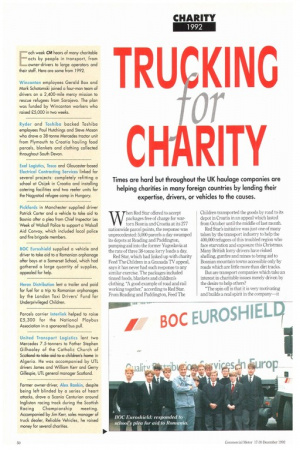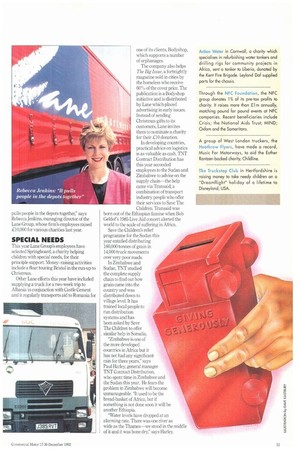TRU KING or C
Page 52

Page 53

If you've noticed an error in this article please click here to report it so we can fix it.
Times are hard but throughout the UK haulage companies are helping charities in many foreign countries by lending their expertise, drivers, or vehicles to the causes.
WThen Red Star offered to accept packages free of charge for wartorn Bosnia and Croatia at its 277 nationwide parcel points, the response was unprecedented: 5,000 parcels a day swamped its depots at Reading and Paddington, pumping aid into the former Yugoslavia at the rate of three 38-tonne lorry loads a day.
Red Star, which had linked up with charity Feed The Children in a Granada TV appeal, says it has never had such response to any similar exercise. The packages included tinned foods, blankets and children's clothing. "A good example of road and rail working together," according to Red Star. From Reading and Paddington, Feed The Children transported the goods by road to its depot in Croatia in an appeal which lasted from October until the middle of last month.
Red Star's initiative was just one of many taken by the transport industry to help the 400,000 refugees of this troubled region who face starvation and exposure this Christmas. Many British lorry drivers have risked shelling, gunfire and mines to bring aid to Bosnian mountain towns accessible only by roads which are little more than dirt tracks.
But are transport companies which take an interest in charitable issues merely driven by the desire to help others?
"The spin off is that it is very motivating and builds a real spirit in the company—it pulls people in the depots together," says Rebecca Jenkins, managing director of the Lane Group, whose firm's employees raised £10,000 for various charities last year.
SPECIAL NEEDS
This year Lane Group's employees have selected Springboard, a charity helping children with special needs, for their principle support. Moneyraising activities include a float touring Bristol in the run-up to Christmas.
Other Lane efforts this year have included supplying a truck for a two-week trip to Albania in conjunction with Castle Cement and it regularly transports aid to Romania for one of its clients, Bodyshop, which supports a number of orphanages.
The company also helps The Big Issue, a fortnightly magazine sold in cities by the homeless who receive 60% of the cover price, The publication is a Bodyshop initiative and is distributed by Lane which placed advertising in early issues. Instead of sending Christmas gifts to its customers, Lane invites them to nominate a charity for their £10 donation.
In developing countries, practical advice on logistics is as valuable as cash. TNT Contract Distribution has this year seconded employees to the Sudan and Zimbabwe to advise on the supply chain the help came via Transaid, a combination of transport industry people who offer their services to Save The Children. Transaid was born out of the Ethiopian famine when Bob Geldof's 1985 Live Aid concert alerted the world to the scale of suffering in Africa.
Save the Children's relief programme for the Sudan this year entailed distributing 160,000 tonnes of grain in 14,000 truck movements over very poor roads.
In Zimbabwe and Sudan, TNT studied the complete supply chain to find out how grain came into the country and was distributed down to village level. It has trained local people to run distribution systems and has been asked by Save The Children to offer . similar help in Somalia.
"Zimbabwe is one of the more developed countries in Africa but it has not had any significant rain for three years," says Paul Harley, general manager TNT Contract Distribution, who spent time in Zimbabwe and the Sudan this year. He fears the problem in Zimbabwe will become unmanageable. "It used to be the bread-basket of Africa, but if something is not done soon it will he another Ethiopia.
"Water levels have dropped at an alarming rate. There was one river as wide as the Thames—we stood in the middle of it and it was bone dry," says Harley,
























































































